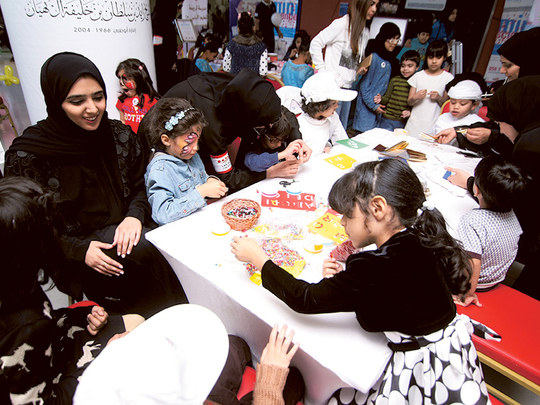
Dubai: In observance of Rare Disease Day, the Shaikh Hamdan Bin Rashid Al Maktoum Award for Medical Sciences held a function at Children’s City in the Creek Park, where experts answered the questions and concerns of parents with children suffering from these conditions.
“The goal of observing Rare Disease Day is to educate all segments of society on how to protect and care for their children, who suffer from these kinds of diseases,” Abdullah Bin Souqat, Executive Director of Shaikh Hamdan Bin Rashid Al Maktoum Award for Medical Sciences, said.
“It is important to take care of patients with rare diseases on both a physical and psychological level, in addition to working on the integration of patients with rare diseases into society,” he said. “This all comes as part of the strategy to transform Dubai into a city friendly to people with disabilities by 2020.”
Bin Souqat said five years ago, the UAE was the only Arab country to observe Rare Disease Day. “Today, more countries in the region are doing their part to research rare diseases and educate the public on how to treat them.”
Dr Fatima Bastaki, head of the organising committee of the Day and paediatrics and clinical genetics consultant, said: “Children will enjoy a specially designed entertainment programme, which will run in conjunction with the main session. A bike march will kick off at noon from Jumeirah 1 to Dubai Creek Park and back, where bikers will raise the logo of Rare Disease Day.”
The programme was inaugurated by a religious lecture by Shaikh Khalid Esmail titled “It’s a mercy’, followed by an interactive session for parents to discuss their concerns with a panel of experts.
Dialogue between experts and concerned parents
A mother of a son in kindergarten who suffers from muscular dystrophy, said she was worried that he would not be admitted into a good school because of his condition.
“Doctors are saying that he is soon to be bound to a wheelchair,” she said, “He is a really smart boy and I am worried that his condition will impede his education.“
In response, Dr Shaikha Alia Al Qasimi, Director of Care Management and Social Integration Community Development Authority, said there is a law specifically designed to ensure people with physical disabilities are not subject to discrimination. “The law protects individuals with disabilities and reserves their right to education and employment across all sectors.”
Dr Bushra Al Mulla, expert in health and social care for children with rare diseases, who is also a mother of a child with disabilities, said parents should be persistent in attaining what they think is best for their child. “My child is the reason for my achievements and helped me reach where I am today,” she said, “He taught me to be persistent and patient. He is now 15 years old and is studying in the eighth grade at a mainstream school. I knew he had the cognitive capacity to pursue a good education. I persistently went from school to school, trying to ensure he gets a seat. This was long before there was any law that would guarantee his rights.”
Mr and Mrs Khan, parents of a 10 year-old son who suffers from Prader-Willi Syndrome, a rare genetic disorder in which seven genes in a particular chromosome are deleted or unexpressed, said: “We took our son for an IQ test and it showed that he is well in the normal range. Although intelligent, he has trouble focusing on three specific subjects: English, maths and science. He does well in every other subject except these three.”
Dr Leena Al Amiri, Consultant in Child and Adolescent Psychiatry at UAE University, suggested that one way parents could deal with such a situation is to pay attention to the specifics of the class and its dynamics. “Oftentimes the answer [to help a child focus] is in a reiterated detail. For instance, if the same teacher teaches all three subjects, then a child’s lack of focus is because of the teaching methods or simply because the teacher speaks too quickly. Other factors could be the child’s seating arrangement or even what period of the day the class is held in.”
Dr Awatef Al Bahr, Consultant in Obstetrics, Gynaecology and Endocrine Infertility, threw light on a potentially preemptive method in in-vitro fertilisation parents could adopt to determine genetic flaws in time. Called the Pre-implantation Genetic Diagnosis (PGD), it enables parents to know if there is a possibility of a genetic disease being passed on.
“The diagnosis essentially profiles the embryos prior to implantation and identifies which embryo has traces of a specific disease. As there are tens of thousands of genetic diseases, it is important for doctors to know exactly what they are looking for when conducting the diagnosis, as it is impossible to test a sample for every single disease.
After embryo-profiling, doctors pick an egg most likely to give a healthy baby.”











